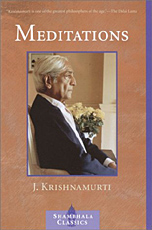J. Krishnamurti (1895 - 1986) was a renowned spiritual teacher whose lectures and writings have inspired millions. The Dalai Lama described him as "one of the greatest philosophers of the age," and his words have had a large impact upon a diversity of seekers, including Dr. Jonas Salk, Aldous Huxley, Joseph Campbell, Van Morrison, and many other scientists, philosophers, and artists. One of the best tributes to J. Krishnamurti comes from the writer Henry Miller: "His language is naked, revelatory and inspiring. It pierces the clouds of philosophy which confound our thought and restores the springs of action. He initiated no new faith or dogma, questioned everything, cultivated doubt and perseverance, freed himself of illusion and enchantment of pride, vanity, and every subtle form of dominion over others. . . . I know of no other living man whose thought is more inspiring."
This expanded edition of brief passages selected by Evelyne Blau from Krishnamurti's books and talks includes some never-before-published material. Here's one of our favorites: "Meditation is one of the greatest arts in life — perhaps the greatest, and one cannot possibly learn it from anybody. That is the beauty of it. It has no technique and therefore no authority. When you learn about yourself, watch yourself, watch the way you walk, how you eat, what you say, the gossip, the hate, the jealousy — if you are aware of all that in yourself, without any choice, that is part of meditation. So meditation can take place when you are sitting in a bus or walking in the woods full of light and shadows, or listening to the singing of birds or looking at the face of your wife or child."
Again and again, this spiritual teacher warns against making meditation complicated by our ideas. It is simple and elegant. Trying too hard is an obstacle to achieving the peace and quiet that are part of this practice. "Meditation is the action of silence," Krishnamurti says simply. He adds: "Meditation is the freedom from thought, and a movement in the ecstasy of truth." This freedom is real: "To meditate is to be innocent of time." And, best of all, "The flowering of love is meditation."
